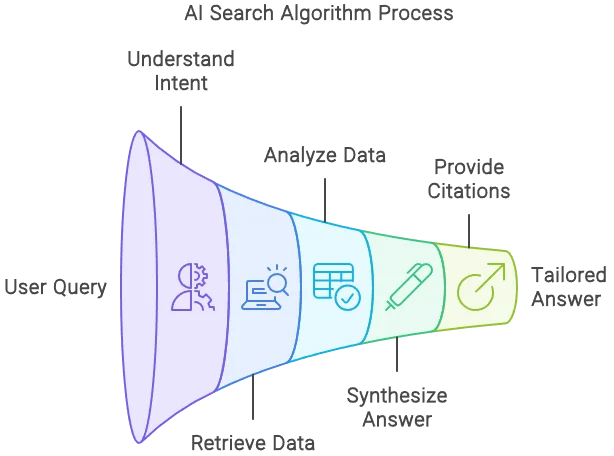
All about SEO for AI Search
AI Search is here to make our research lives easier. No more wading through endless ads or irrelevant links.
Services like Perplexity, Google AI Overviews (previously Google SGE), Gemini, SearchGPT, and more promise a laser-focused, ad-free experience, delivering concise answers with real-time data and clear citations.
Say, you’ve got a burning question. Maybe it’s the history of the spork or the optimal water temperature for brewing the perfect cup of tea.
AI search engines can handle it. Astonishingly well, in fact.
But if you’re on the “giving” end of the equation and you want your website to be the answer an AI search engine serves up, you need to understand how it works.
Since I believe that AI search engines are going to be the future (and I suggest you start believing it too), I’m going to show you how you can optimize your site and content to get cited and mentioned by Perplexity, Gemini, SearchGPT and the like.

So, without further ado, here’s all you need to know about SEO for AI search engines.
Why Care About SEO for AI Search?

1. It Helps Your “Traditional” Search Engine Rankings
Unlike traditional search engines that might display a handful of linked sources per page, AI search engines like Perplexity take a citation-heavy approach.
More and more AI search engines will – ultimately – have to follow suit in the shadow of Perplexity. Users and publishers alike demand as much.
Now, the Search Engine Journal reveals in one of their articles that Perplexity prioritizes websites that its language models cite more frequently.
This fact unlocks a fascinating opportunity for Perplexity AI SEO. Hence, inevitably, this will happen for all other AI search machines as well.
Imagine crafting content so compelling and informative that AIs deem it a valuable source. The more Perplexity, Gemini, SearchGPT and co. cite your website, the higher it potentially climbs in search rankings.
2. Being Cited by an AI is a Form of Social Proof
And being cited by AI search engines often positions your brand as the go-to expert within your niche. Why? Because being cited by others is proof that you’re the real deal.
3. AI Search Engines are Likely the Future
As soon as AI answers to search queries become trustworthy enough, people will stop using traditional search engines for most online searches and research.
This I am certain of.
Why scroll through an endless amount of (maybe) half-trustworthy results when you can just get a very accurate aggregate answer to your question in one or two sentences?
The sooner you (as a website owner) act to get on AI search engine’s radars, the better, wouldn’t you agree?
You Have to Start Optimizing For AI Search

This all makes it attractive to start a strategic SEO approach focused on content that aligns with any AI search’s information-gathering habits, right?
By understanding the types of sources Gemini, SearchGPT, and Perplexity favor (scientific papers, credible articles, etc.) and tailoring content accordingly, you can increase the chances of your website becoming a go-to resource within their ecosystem.
While the specifics of all AI search citation algorithms remain under wraps, focusing on high-quality, well-researched content with strong source citations is likely a winning strategy for AI SEO.
Here are what I know (so far) about optimizing for Perplexity’s AI search:
Feeding the Beast: How AI Gathers Information
Perplexity is a data fiend, constantly chomping on information from a variety of sources. Here’s a peek at its information buffet:
- AI Powerhouses: Perplexity leans on advanced language models like GPT-4 and Claude to summarize key information, rewrite content for clarity, and double-check facts. Think of them as superpowered research assistants.
- Real-Time Knowledge: Perplexity taps into trending Google searches, breaking news, and dynamic website data to keep its answers fresh. Unlike some static search engines, Perplexity serves up the latest and greatest.

- A Vast Knowledge Base: Perplexity has been studying for years, amassing a massive dataset of text and code across various domains. This broad knowledge allows it to answer a mind-boggling range of questions with precision.
- Understanding Your Intent: Perplexity uses natural language processing to truly grasp what you’re asking. It doesn’t just focus on keywords; it dives deeper to deliver relevant and tailored information.
- Diverse Sources: Perplexity isn’t afraid to get its information from everywhere – scientific papers, news articles, government websites, you name it. It then synthesizes these insights into a cohesive answer, just like a master storyteller weaving a tale.
How AI Search Algorithms Work
AI search engines like for example, Perplexity’s or Google’s AI Overviews algorithm, are like well-oiled machines: They run like a racehorse but are difficult to understand.
First, we should note: It’s not about pages, it’s about “snippets”
I used to think AI search was just “Googling on steroids”, a.k.a. finding the best pages and summarizing them. I was wrong. It’s not that simple.
Recent insights from the engineers building these systems (specifically at Perplexity) have peeled back the curtain. It turns out, AI search doesn’t look at your website as a “document.” It looks at it as a pile of Lego bricks.
This is called Sub-Document Processing.
Here is the simple breakdown of how it actually works:
- The Shattering: When the AI crawls your site, it doesn’t just index the page, it shatters your content into tiny fragments called “granular snippets”. These are sometimes as small as 2 to 4 words (or 5–7 tokens).
- The Context Window: Every AI has a “memory limit” for each search, called the Context Window. The AI search engine’s goal is to fill this window completely with facts to prevent it from “hallucinating” (making things up to fill the context window).
- The Saturation: The engine pulls roughly 26,000 of these tiny snippets from all over the web to fill that window.
Why does this matter for you? Because the AI isn’t judging your entire page against a competitor’s entire page. It is judging your specific sentence against a million other sentences to see if it deserves one of those 26,000 spots in the Context Window.

1. Understanding Your Question
First, AI search engines use natural language processing to truly understand what you’re searching for. It’s not just about the words you type, but the intent behind them.
They then scour the web (using the snippet method outlined before) for answers to satisfy your intent as perfectly as possible.
To do this, they find multiple snippets from authoritative sites that “sound” like they understand your search intent.
2. Knowledge Base & Web Search
Perplexity, for example, taps into its massive knowledge base and simultaneously scours the web in real-time to find the most relevant and up-to-date information.
So, very obviously, presenting data to Perplexity that is as up-to-date as possible is key. It likely values content freshness more than other search engines.
Inevitably, I believe, all AI search algorithms will go the way of Perplexity.
3. AI Analysis
AI search models analyze the retrieved data, extracting key points and ensuring factual accuracy.
This is likely done by cross-referencing with other data sources – possibly even from academic research papers.
As soon as the algorithm has filtered out which sources are trustworthy, accurate, and satisfy searcher intent, it will put together an AI-generated aggregate of the snippets from those sources.
4. Concise & Clear Answer
Perplexity, like most AI search engines so far, synthesizes the information into a clear, concise, and user-friendly answer tailored to your specific needs.
And here’s the key: It’s completely tailored to your query. In other words, if your content is the only piece that satisfies even the most outlandish queries, you WILL be cited as a source.
And remember, being cited OFTEN by Perplexity (and likely any other AI search engine) is a ranking factor.
5. Citations for Credibility
Finally, nowadays all of the major AI search engines back up their answer with citations to the most relevant source materials, so you can verify the information yourself.
This is a link opportunity you don’t want to miss out on.
I fear that in the not-so-distant future, this will be one of the few ways websites can get traffic “organically”. You will want to belong to those websites.
Ranking Signals Used by AI Search Engines
AI search engines still have the same goal as traditional search: provide the user with the best answer to their query possible. They just approach the response from a different angle.
So how do you optimize for this to get your citation ranked high? Here’s the gist:

How to Think Like Perplexity
Imagine Perplexity’s language model is a picky eater. It devours high-quality, credible websites, and the more a page gets cited, the tastier it becomes in Perplexity’s eyes. Sound familiar? It’s a close cousin to Google’s PageRank algorithm.
By the way, if you’re interested in how to do SEO the modern way, I suggest you click the link and read my dedicated article on the topic next.
Perplexity’s AI models are like detectives, constantly sniffing out real search terms people use on Google. So, put away your “traditional SEO hat” and start thinking like a layman.
By aligning your content with layman’s terms, you boost your website’s ranking relevance in Perplexity’s search results.
AEO vs. GEO: Optimizing for “Information Density”
We are moving away from just SEO and into a split world of GEO (Generative Engine Optimization) and AEO (Answer Engine Optimization).
For AI search engines like Perplexity, Information Density is the new king.
Remember those 26,000 snippets I mentioned? The AI has limited space in its “brain” (the context window). If your content is full of fluff (long intros, wandering anecdotes, or keyword stuffing) the AI views it as “low value” data. It wastes space.
A short video with some additional tips on how to rank in AI search:
To get cited, you need to optimize for “Snippability”:
- Cut the Fluff: If a sentence doesn’t convey a hard fact or a direct answer, it’s liable to be ignored.
- Modular Writing: Structure your content so that individual paragraphs (or even sentences) make sense on their own. The AI might rip a single paragraph from the middle of your article to answer a user’s question.
- Fact-Heavy formatting: Use bullet points and data tables. These are “high calorie” meals for an AI looking to fill its context window with data.
The Future of AI Search
I’ll be completely frank here; you deserve as much.
I believe AI search is the future. It will take a while to fully get to a time when every single online search is AI-answered, but we WILL get there inevitably.

Think about it: it’s the most user-friendly option.
Obviously, provided we get AI search results that are nearly 100% factually accurate and trustworthy.
In fact, eventually, every online search will be spoken, not written. Most likely even, every word we “write” will not be written but spoken as well. It’s just easier and faster for us humans.
Sure, there’s the exception of people with hearing and speaking disabilities, but I’m certain there will be comparative alternatives for them.
Personalized Context Injection
And there is one more massive shift coming: Context Injection.
Unlike Google, which largely treats every search for “best running shoes” the same, AI search engines have the capacity for memory. They inject “who you are” into your search query.
This means in 2026 and beyond, you aren’t just ranking for keywords. You are ranking for user context as well. The answer the AI builds for me will be different from the answer it builds for you, even if we ask the exact same question.
Your content needs to be diverse enough to cover these different personal contexts, or as I like to call it: “Personalization-Ready Content”. But that’s a topic for a different article.
So, as a business and website owner, why would you not want to be at the forefront of this technological advancement and position your site and content as an AI-cited expert in your field?
I know I want to.
So, here’s my offer to you:
If you’re looking for help optimizing your website for the coming “AI search revolution”, I’ll gladly help you out with a short 30-minute consultation call. Free of charge.
Simply write me an email at patrick@ptg-marketing.com telling me you read this article and that you’d like some free advice on AI SEO.
I’m sure a short half-hour talk can give you some insight you won’t want to miss out on. And if you don’t like what I have to say? No harm done, right?
In any case, thanks for reading.
FAQs about AI Search
Resources Used to Write This Article:
Chen, Y., Chen, E., Zhang, K., Liu, Q., & Sun, R. (2024). A relation-aware representation approach for the question matching system. World Wide Web.
Read the article
